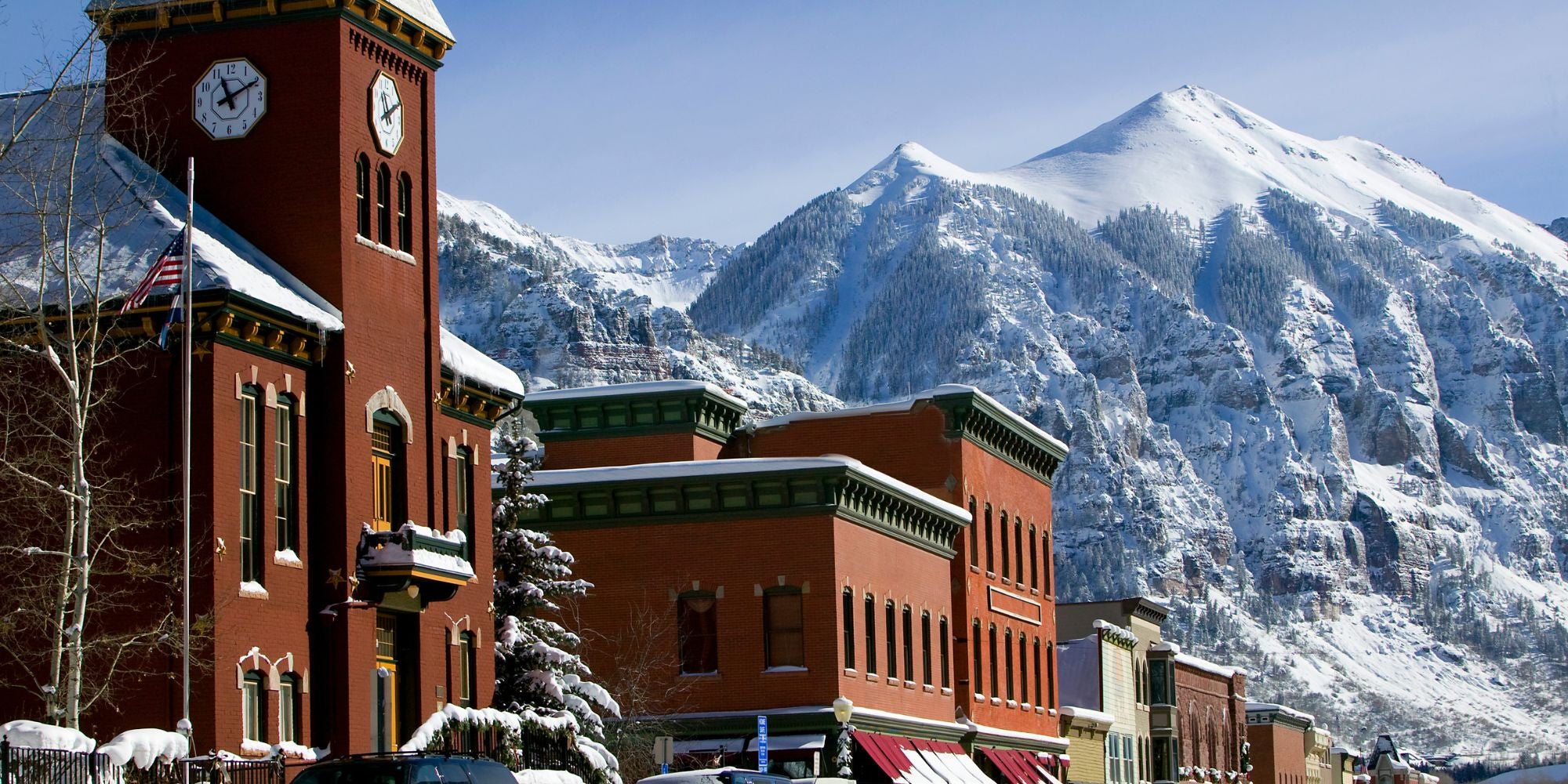
Many travelers and skiers wonder what is the altitude of Telluride Colorado, as altitude sickness can quickly ruin your Rocky Mountain trip. We're a Colorado-based company with experience to share with you what the altitude of Telluride Colorado is and tips how to avoid Telluride altitude sickness.
Telluride is located at a high altitude of 8,750 feet above sea level. Sitting in a box canyon, the town of Telluride altitude is actually the lowest of the local area.
Telluride is a mountain town in southwestern Colorado surrounded by San Juan National Forest, at an altitude a lot higher than Denver which is at 5,280 feet above sea level.
Telluride's isolation and beautiful mountains has led to its its reputation as one of the most beautiful places in Colorado. The town is popular with skiers, hikers and other outdoor enthusiasts.
If hiking, skiing, or climbing, the San Juan mountains throughout Telluride can get as high as 13,000 to 14,000 feet. This mountain range is known to be one of the most prominent and notched summits in Colorado and United Staes.
Altitude of nearby spots include:
The altitude of Telluride Colorado is one of the highest of mountain towns throughout the state. Keep reading to learn more about the dangers of altitude sickness.
Yes, Telluride can give you altitude sickness.
University Of Michigan states that altitude sickness can occur starting at 6,000 feet (1,828 m) in elevation.² Telluride sits at well over 8,000 feet, making the risk of altitude sickness very high. And being locally based, we see some visitors get altitude sickness in Denver at only 5,280 feet high.
These heights of Telluride cause a combination of physiological stress on the body including lack of oxygen, oxidative stress, and increase respiration — that can lead to altitude sickness.
It's best to be well prepared for Telluride altitude sickness and take precautions such as our tips below.
The symptoms of Telluride altitude sickness, also known as acute mountain sickness, are mainly caused by a lack of oxygen and your body's response. This can include symptoms such as headaches, nausea, and difficulty breathing.
Symptoms of Telluride Altitude Sickness may include:
Altitude sickness can usually develop within 6-24 hours of arrival in the high altitudes of Telluride. You should monitor yourself for feeling any signs of altitude sickness.
In particular, people who live at sea level and go from there to places like Colorado might experience more severe symptoms of altitude sickness because their bodies aren't used to the change in elevation.
Telluride is one of the most beautiful mountain towns in America. It's also a place where altitude sickness can strike without warning. If you're coming to Telluride for the first time and are planning on spending some time in the mountains, you may be wondering how to prevent altitude sickness.
Altitude sickness is a common concern among people who have never been above 8,000 feet before. In fact, about one in four people who spend time at high altitudes like Telluride experience mild symptoms of altitude sickness, and up to 50% at altitudes over 10,000 feet.³
Being based in Colorado, we have a lot of experience and research on high altitudes and we'll reveal our top tips to help you prevent altitude sickness in Telluride.
5 Tips To Prevent Telluride Altitude Sickness:
To conclude out top researched tips to prevent Telluride altitude sickness ─ this includes staying hydrated, gradually acclimating, resting and taking it easy, limiting alcohol consumption initially, and supplementing glutathione.

Zaca Chewables are a great way to replenish nutrients, hydrate, and recover faster. Made from pure ingredients, these fast-acting chewables are formulated with glutathione and other essential nutrients. With a delicious berry taste and easy on-the-go packets, Zaca makes hydrating easy. Simply take 2-4 chewables per day on your trip, or as needed. Try Zaca Chewables today and fuel your mountain adventures.
SOURCES:
1. Telluride Colorado Wikipedia
https://en.wikipedia.org/wiki/Telluride,_Colorado
2. Altitude Sickness University Of Michigan Health Service
https://uhs.umich.edu/travel-altitude-sickness
3. High-altitude illness (including mountain sickness) (Beyond the Basics)
https://www.uptodate.com/contents/high-altitude-illness-including-mountain-sickness-beyond-the-basics
4. Sleep: The Secret Ingredient of Injury Recovery
https://www.orthocarolina.com/media/sleep-the-secret-ingredient-of-injury-recovery
5. Effect of high altitude (7,620 m) exposure on glutathione
https://pubmed.ncbi.nlm.nih.gov/11320641/
Copy the coupon code & use it at checkout